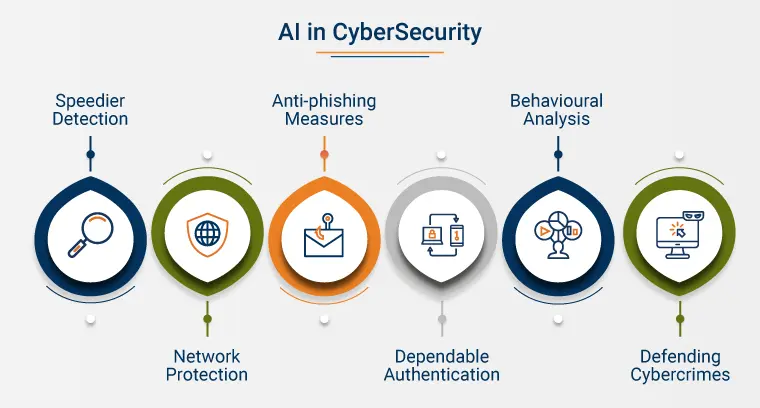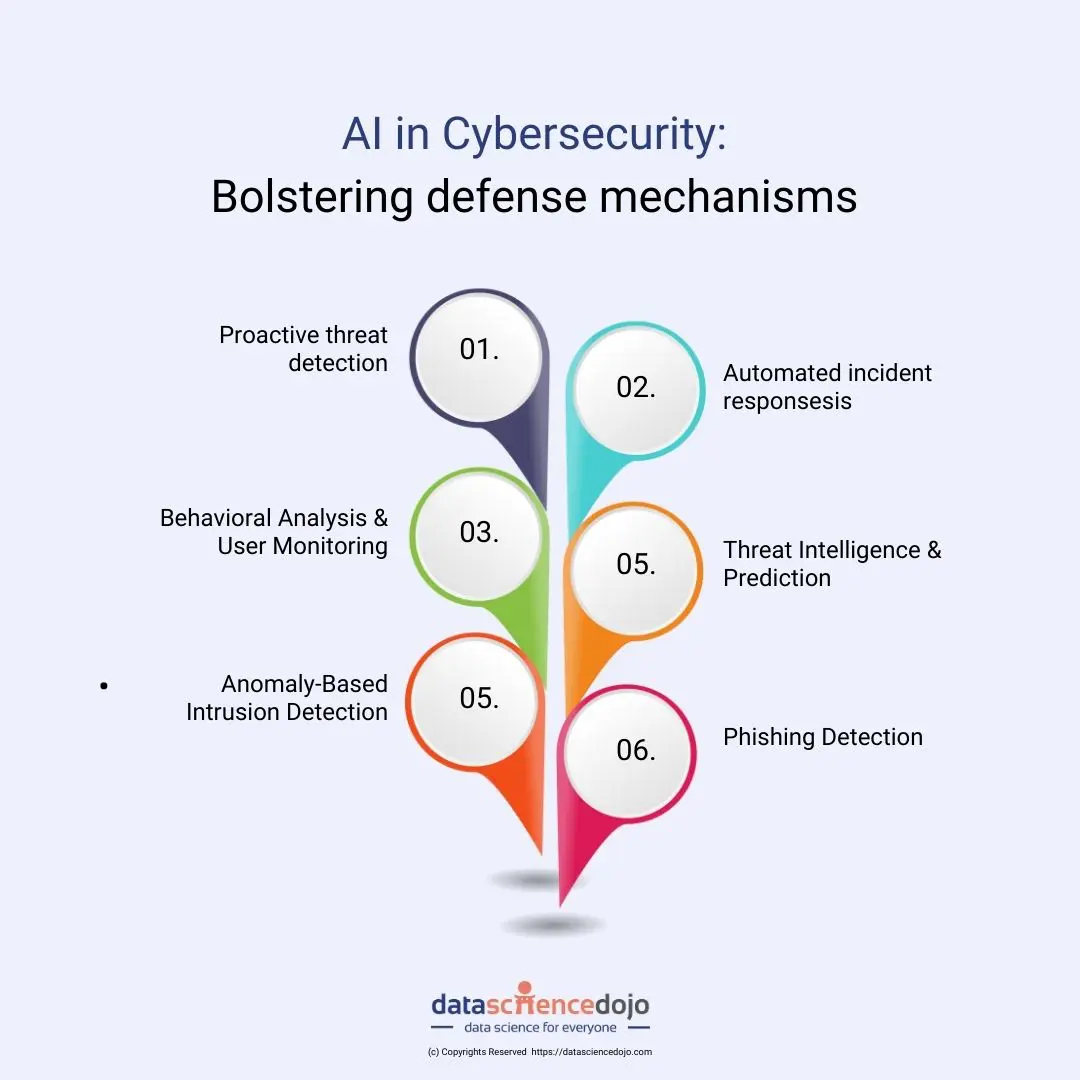As technology continues to advance at an astonishing pace, the realm of cybersecurity is faced with new and evolving threats. In this digital age, protecting sensitive information and networks from cyber attacks has become a paramount concern. One emerging solution to combat these threats is the role of Artificial Intelligence (AI) in cybersecurity. AI has the potential to revolutionize threat detection and response, offering an innovative and powerful approach to safeguarding our digital landscape.
AI in cybersecurity has the ability to analyze vast amounts of data in real time, enabling it to detect patterns and anomalies that may indicate a potential threat. By constantly learning and adapting, AI systems can stay one step ahead of cybercriminals, identifying and neutralizing attacks before they can cause significant damage. In fact, studies have shown that AI-powered cybersecurity tools can detect up to 85% of cyber attacks, providing a level of efficiency and accuracy that human analysts simply cannot achieve alone. With cyber attacks becoming more sophisticated and frequent, the implementation of AI in cybersecurity is not just a luxury, but a necessity in today’s digital landscape.

The Role of AI in Cybersecurity: Threat Detection and Response
The role of Artificial Intelligence (AI) in cybersecurity has become increasingly important in today’s digital landscape. With the rapid advancement of technology and the proliferation of cyber threats, organizations need advanced tools and techniques to protect their sensitive data and systems. AI offers a powerful solution by enabling more efficient and effective threat detection and response capabilities. By leveraging machine learning algorithms and advanced analytics, AI can analyze vast amounts of data and identify patterns and anomalies that indicate potential security breaches or attacks. This article explores the various ways in which AI contributes to cybersecurity, focusing specifically on threat detection and response.
AI-powered cybersecurity systems have the ability to continuously monitor network traffic, log files, user behavior, and other relevant data sources to identify potential threats in real-time. This proactive approach allows organizations to detect and respond to security incidents before they cause significant damage. By using AI algorithms to analyze and correlate data from multiple sources, cybersecurity systems can quickly identify suspicious activities, such as unauthorized access attempts, malware infections, or abnormal user behavior.
To effectively protect against evolving cyber threats, AI systems utilize machine learning techniques to learn from past incidents and adapt their detection capabilities. By analyzing historical data and identifying patterns, AI algorithms can constantly refine their models and improve their ability to detect new and emerging threats. This adaptive approach is crucial in the rapidly changing cybersecurity landscape, where attackers are constantly devising new techniques to bypass traditional security measures.
The integration of AI and cybersecurity is particularly relevant in the context of secure cloud technologies and the Internet of Things (IoT). As organizations increasingly rely on cloud-based services and IoT devices, the attack surface for cybercriminals expands. The article “Secure Cloud Technologies: The Future of Cybersecurity” and “Cybersecurity for IoT: Securing the Connected World“* discuss the importance of securing cloud technologies and IoT devices respectively. AI plays a crucial role in securing these environments by providing advanced threat detection capabilities and enabling rapid response to potential attacks.
The Benefits of AI in Threat Detection and Response
The integration of AI into cybersecurity brings several benefits, enhancing organizations’ ability to detect and respond to threats effectively. Here are some key advantages of using AI for threat detection and response:
- Increased Speed and Efficiency: AI-powered cybersecurity systems can analyze vast amounts of data in a fraction of the time compared to manual analysis. This enables faster detection of threats and quicker response times, minimizing potential damage.
- Advanced Threat Detection: AI algorithms can identify complex and sophisticated threats that may go unnoticed by traditional security measures. By analyzing patterns and anomalous behavior, AI systems can detect and alert organizations to potential security breaches or attacks.
- Reduced False Positives: Traditional cybersecurity systems often generate a high number of false positives, leading to alert fatigue and wasted resources. AI algorithms, with their ability to learn and adapt, can reduce the number of false positives by improving the accuracy of threat detection.
- Continuous Monitoring: AI-powered systems can monitor network traffic, user behavior, and other data sources in real-time, providing organizations with continuous visibility into potential threats. This proactive approach enables timely response, reducing the impact of cyber attacks.
Threat Intelligence and AI
Threat intelligence plays a crucial role in AI-powered cybersecurity. It provides valuable information about the latest cyber threats, attack vectors, and malicious actors, allowing organizations to stay ahead of potential risks. AI algorithms can analyze threat intelligence feeds, identify patterns, and correlate them with real-time data to enhance threat detection capabilities.
By combining threat intelligence with AI, organizations can gain a deeper understanding of the ever-changing threat landscape and develop more effective security strategies. AI systems can continuously learn from threat intelligence data, updating their models to incorporate new threat behaviors and attack techniques. This enables organizations to proactively respond to emerging threats and prevent potential security breaches.
Additionally, AI-powered cybersecurity systems can contribute back to the threat intelligence community. By identifying new threats and analyzing their characteristics, AI algorithms can generate valuable insights that can be shared with other organizations and security professionals. This sharing of information helps in building a collective defense against cyber threats and enhances the overall security posture across industries.
AI in Incident Response
AI technologies are also transforming incident response capabilities by automating and streamlining the processes involved in detecting, analyzing, and responding to security incidents. Here are some key ways in which AI enhances incident response:
- Automated Alert Triage: AI-powered systems can automatically analyze and prioritize security alerts based on severity, potential impact, and other contextual factors. This helps in reducing response times and ensures that critical incidents receive immediate attention.
- Automated Investigation: AI can assist in automating the investigative process by correlating data from multiple sources, such as log files, network traffic, and user activity. This speeds up the identification of the root cause of an incident and enables faster containment and mitigation.
- Playbook Execution: AI can execute predefined incident response playbooks, automating repetitive tasks and enabling rapid response to security incidents. This frees up security analysts’ time, allowing them to focus on more complex tasks that require human expertise.
- Threat Hunting: AI algorithms can proactively search for unknown threats and indicators of compromise by analyzing large volumes of data. This helps in identifying stealthy attacks that may otherwise go undetected by traditional security measures.
Challenges and Considerations
While AI brings significant benefits to cybersecurity, there are also challenges and considerations that organizations need to be aware of:
Data Quality: The effectiveness of AI algorithms relies on the quality and relevance of the data they analyze. Organizations need to ensure that they have access to clean and reliable data sources to train their AI models accurately. Poor data quality can lead to inaccurate predictions and false positives or negatives.
Adversarial Attacks: Adversarial attacks are techniques used to deceive AI algorithms and trick them into making incorrect predictions. Cybercriminals may exploit vulnerabilities in AI models to evade detection or launch more sophisticated attacks. Continuous monitoring and testing of AI systems are essential to identify and mitigate the risk of adversarial attacks.
Ethical Considerations: The use of AI in cybersecurity raises ethical considerations, such as privacy implications and potential bias in decision-making. Organizations need to ensure that their AI systems adhere to ethical guidelines and regulatory requirements. Transparent and explainable AI models are crucial for building trust and ensuring accountability.
Human Expertise: While AI enhances threat detection and response capabilities, human expertise remains crucial. AI systems are not a complete replacement for skilled cybersecurity professionals. Human analysis and decision-making are still necessary to validate and interpret the output of AI algorithms and to handle complex incidents that require domain knowledge and experience.
Conclusion
The role of AI in cybersecurity, particularly in threat detection and response, is rapidly evolving and becoming indispensable in addressing the ever-increasing cyber threats faced by organizations. AI-powered systems offer advanced capabilities for identifying and mitigating security risks, enabling organizations to stay one step ahead of attackers.
By leveraging machine learning and advanced analytics, AI can analyze vast amounts of data, detect complex threats, and automate incident response processes. Integrating threat intelligence with AI enhances organizations’ ability to understand and respond to emerging threats quickly.
However, organizations must also be aware of the challenges associated with AI, such as data quality, adversarial attacks, and ethical considerations. AI should be viewed as a tool that complements human expertise rather than a standalone solution.
As the cybersecurity landscape continues to evolve, AI will play an increasingly critical role in protecting organizations from cyber threats. Embracing AI-powered cybersecurity solutions can enhance an organization’s security posture and enable a proactive and efficient approach to threat detection and response.
For more insights on cybersecurity trends and best practices, visit Thoughts.tech.
The Role of AI in Cybersecurity: Threat Detection and Response
- AI helps identify and analyze potential threats in real-time.
- AI automates the process of detecting and responding to cybersecurity incidents.
- AI can quickly adapt and learn from new threats, improving its detection capabilities over time.
- AI-powered systems can assist security teams in prioritizing and addressing security alerts.
- AI helps in reducing false positives and false negatives, increasing the accuracy of threat detection.

The role of AI in cybersecurity is crucial for detecting and responding to threats. With AI technology, computers can analyze large amounts of data quickly to identify suspicious activities.
AI can also learn from historical data and patterns to improve its detection capabilities over time. By leveraging AI, organizations can strengthen their cybersecurity defenses and stay one step ahead of cybercriminals.


